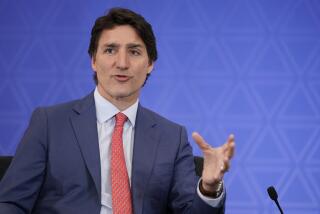Tensions rise between U.S., Pakistan spy agencies
- Share via
Reporting from Islamabad, Pakistan, and Washington — American and Pakistani intelligence services have become deeply estranged in recent weeks after several high-profile disputes, though senior officials from both countries say they continue to cooperate against Al Qaeda militants.
The disclosure this week that Raymond Davis, the 36-year-old American who shot dead two Pakistani men in Lahore last month, was a CIA contractor working under cover was the latest episode to exacerbate mistrust between the two countries’ spy agencies.
In December, the CIA station chief in Pakistan had to leave the country after his identity became public. Some U.S. officials suspected that Pakistan’s Directorate for Inter-Services Intelligence, or ISI, had a hand in leaking the information. U.S. officials have said they believed it may have been in retaliation for a lawsuit filed in the United States by relatives of victims of the 2008 terrorist attack in Mumbai, India, that accuses ISI chief Ahmed Shuja Pasha of involvement.
Last week, Democratic Sen. Dianne Feinstein of California, who regularly receives CIA briefings as head of the Senate Intelligence Committee, expressed frustration with the relationship, saying that Pakistan continues to “walk both sides of the street” by supporting elements of the Taliban while helping the United States pursue Al Qaeda fighters.
The CIA and the ISI work closely to coordinate U.S. drone strikes against Al Qaeda and Taliban militants in Pakistan’s tribal regions on the border with Afghanistan, among other things. But the United States also spies on the ISI, seeking information about its connections to Taliban militants, Pakistan’s nuclear program and the country’s simmering rivalry with India. The ISI, in turn, monitors CIA officers in Pakistan.
Pakistani intelligence officials most recently have been angered by the Davis case, which they say raises the prospect that hundreds of CIA contractors may be secretly roaming Pakistan without the ISI’s knowledge. Davis, who has been charged with murder, says the two men he shot Jan. 27 in Lahore were trying to rob him at gunpoint.
The United States says Davis enjoys diplomatic immunity and cannot be criminally prosecuted. But many in Pakistan, where anti-American sentiment runs high, want him brought to trial.
The ISI is concerned about the potential presence of large numbers of American intelligence contractors because a large batch of visas was recently approved without proper screening, said a senior Pakistani intelligence official who spoke on condition of anonymity because he is not authorized to speak on such matters.
Last year, the United States got Pakistan to agree to expedite visas for scores of American diplomats, aid workers and other officials needed to help facilitate the distribution of revenue from a five-year, $7.5-billion economic aid package approved by Congress in 2009. Pakistan agreed to approve the visas without screening from the ISI or the Interior Ministry.
“We don’t know how many of them are bona fide diplomats or businessmen or NGO workers, and how many are [intelligence operatives],” the senior Pakistani intelligence official said. “It’s our right to know who is coming to Pakistan and for what purpose ….There are bona fide CIA guys, and we know who they are. They work with us. We talk to them. We meet them. But it’s the people we don’t know about that are the concern.”
The Pakistani intelligence official said cooperation between the ISI and CIA has continued, albeit “at a slightly lower level” compared with the degree of collaboration before the Davis case.
“The relationship between the CIA and the ISI has had its ups and downs, but the Davis incident brought it quite down,” the official said. “Since then, however, sanity has prevailed. Both of us realize we need each other to fight this war successfully.”
U.S. officials said the differences cannot get in the way of a valuable working relationship.
“The CIA works closely with our Pakistani counterparts on a wide range of security challenges, including our common fight against Al Qaeda and its terrorist allies,” CIA spokesman George Little said. “When there are issues to sort out, we work through them. That’s the sign of a healthy partnership.”
Cooperation between the CIA and ISI dates to the 1980s, when the agencies worked together to bolster the Afghan mujahedin fighting the Soviet occupation of Afghanistan.
After a lull, two U.S. drone strikes were reported in the last few days, suggesting that some level of cooperation continues. Pakistan’s air force can shoot down slow-flying drones over the country’s territory if it so chooses, military analysts noted.
In addition, Adm. Michael G. Mullen, chairman of the U.S. Joint Chiefs of Staff, and Army Gen. David H. Petraeus, commander of U.S. forces in Afghanistan, met this week in Oman with Pakistani military officials, including Gen. Ashfaq Kayani, Pakistan’s army chief of staff.
Rodriguez reported from Islamabad, Pakistan, and Dilanian from Washington.
More to Read
Sign up for Essential California
The most important California stories and recommendations in your inbox every morning.
You may occasionally receive promotional content from the Los Angeles Times.














